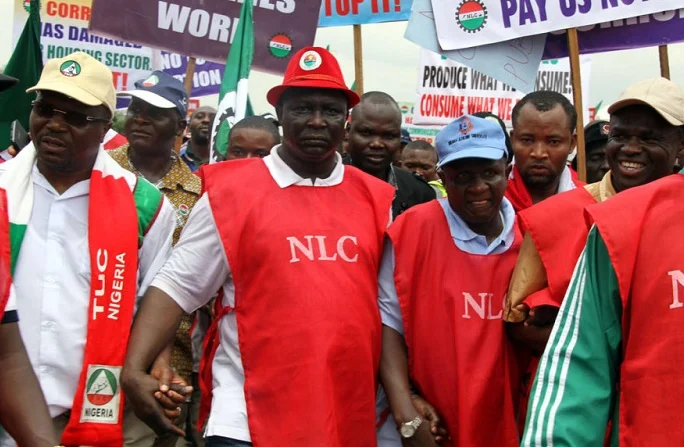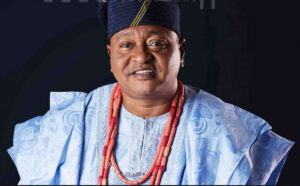Labour Set For Protest, FG Suspends Subsidy Removal, NBA Warns Govt
The Nigeria Labour Congress will continue with its planned nationwide protest on Thursday despite the announcement by the Federal Government that it would no longer remove the fuel subsidy for now.
Ahead of the mass rally, the NLC has written to the 36 state governors to demand the withdrawal of the removal of the fuel subsidy scheduled for June.
The NLC argued that the perennial hike in the pump price of petrol and other refined petroleum products was a transfer of government failure and inability to effectively govern the country.
But the Minister of Finance, Budget and National Planning, Zainab Ahmed; and the Minister of State Petroleum Resources, Timipre Sylva; at the National Assembly on Monday said the Federal Government had suspended the plan to remove fuel subsidy.
Despite the new development, the Assistant General Secretary, NLC, Asuzu Echezona, confirmed that the rally would go on as planned. “We are continuing with preparation for the protests,” he clarified on Thursday night.
Also, the Ogun State Chairman of the NLC, Emmanuel Bankole, in an interview with The PUNCH, said the union was going ahead with the protest.
He stated, “The congress observed a game plan and deceit in the new development hence, there is no going back in the planned protest scheduled in the state against the plan by the Federal Government.
“We are aware (of the suspension of the fuel subsidy removal). We are going ahead with the Thursday protest. There is no going back.”
It was gathered that the union leader could not unilaterally call off the planned protest without convening meetings of their national executive councils.
Earlier, the NLC, in the letter to the governors, written by its President, Ayuba Wabba and General Secretary, Emmanuel Ugboaja, and made available to journalists on Monday, berated the government for its failure to manage the nation’s four oil refineries and inability to build new ones.
“It is tragic and shameful that Nigeria is about the only OPEC (Organisation of Petroleum Producing Countries) country that cannot refine her crude oil,” the congress stated.
It said the government should re-engage the organised labour in discussions to find “mutually acceptable solutions to the current quagmire in Nigeria’s downstream petroleum sub-sector.”
The letter titled, ‘Petition by Nigerian workers against the proposed increase in the price of Premium Motor Spirit,’ stated, “The Federal Government should announce the withdrawal of its plans to increase the pump price of petrol.
“There is no gainsaying the fact that the perennial increase of the pump price of petrol and other refined petroleum products by the government is actually a transfer of government failure and inability to effectively govern to the poor masses of our country.
“Central to this is the failure of the government to manage Nigeria’s four oil refineries and inability to build new ones. It is tragic and shameful that Nigeria is about the only OPEC country that cannot refine her own crude oil.”
Meanwhile, the NLC has written to the Federal Capital Territory Police Command on its mass rally holding on Thursday.
The spokesperson, FCT police command, DSP Josephine Adeh, while confirming this to The PUNCH on Monday, explained that the congress did not need a police permit for its rally.
She stated, “They have written to inform us about the protests so our men would be on the ground to provide protection for them. They don’t need a permit to hold their protests but their letter was simply to inform us about the protests.”
Also, chapters of the NLC in states including Delta, Cross River, Ekiti, Ogun and Lagos said they were going ahead with the protest.
The Chairman of Ekiti State chapter, Kolapo Olatunde, said on Monday that the protest would be total in the state.
FG suspends plan to remove subsidy
But the Minister of Finance, Budget and National Planning, Ahmed; and the Minister of State Petroleum Resources, Sylva; told the National Assembly that the Federal Government had suspended the plan to remove subsidy on petroleum products especially Premium Motor Spirit (petrol) until further notice.
Ahmed, Sylva and the Group Managing Director of NNPC Limited, Mele Kyari, among others, were at the National Assembly on the invitation by the President of the Senate, Ahmad Lawan, over the controversy on the plan to end the subsidy.
At the meeting with the parliament, Ahmed admitted that the Federal Government initially had the plans to end the subsidy from July this year, saying provision for subsidy payments was made in the 2022 Appropriation Act up to June.
The minister said, “Let me start by stating the fact that we did make a provision in the 2022 budget for fuel subsidy from January to June, and that suggests that from July there would be no subsidy. This provision was made sequel to the approval of the Petroleum Industry Act that all products would be deregulated.
“Subsequent to the passage of the Act, we went back and amended the fiscal framework and submitted it to the National Assembly to incorporate this money. But after the budget was passed and we have had consultation with a number of stakeholders, it became clear that the timing is problematic; that practically, there is still heightened inflation, hence the removal of subsidy will rather worsen the situation, thereby imposing more difficulties on the citizens and the President clearly does not want to do that.”
She said efforts were on to boost the country’s oil refining capacity which includes the inauguration of the 650,000bpd refinery (owned by Dangote Group) and the rehabilitation of the four national refineries that have a combined refining capacity of 450,000barrels per day and also the rehabilitation.
Ahmed added that a supplementary budget may be sent to the legislative to provide funding for subsidy beyond June.
“As we are discussing, there is a possibility of amending the budget; we need to come back to the National assembly by way of amendment to make additional provision for fuel subsidy from July 2022 going forward.
“We are exploring ways of going through various discussions with stakeholders as well as the civil society and labour union, ways by which we can address this removal in a manner that is graduated that will have minimal impact on the citizens. So, we will come back to the citizens,” she said.
In his remark, Sylva stated that the PIA cannot be implemented within six months. He, therefore, proposed more amendments to the Act as well as a supplementary budget to cover subsidy payments beyond June.
“As far as I am concerned, this, at this point, is a legislative duty. The law has been passed, we are all aware, but there is no law that is cast in stone. It is clear to everyone that, at this point in operationalising the law, is not possible within the six-month framework that has been provided for in the law.
“And if that timeframe provided for in the law is feasible, which has come to us as a result of operationalising the law, then, it is also a legislative responsibility now to see what can be done in extending that timeframe for it to be in the purview of the law,” Sylva said.
Senate President Ahmad Lawan said the President was moved by the need to protect Nigerians from further economic hardship.
He, therefore, called on the organised labour to suspend plans to embark on protests.
Fix transport, electricity, refineries first, experts tell FG
But experts that spoke to The PUNCH called on the government to fix the moribund refineries and electricity before removing subsidy. Professor of Economics at the Olabisi Onabanjo University, Ago-Iwoye, Ogun State, Prof Sheriffdeen Tella, advised the Federal Government to focus on boosting domestic production.
He urged the government to ensure that the refineries were working rather than focusing on removing the fuel subsidy.
Tella said, “We should not be talking about fuel subsidy. We should be talking about making the refineries work. If the government cannot make it work, they can commercialise it. Doing something to ensure our refineries are working is what is important.”
The former President of the Association of National Accountants of Nigeria, Dr. Sam Nzekwe, advised the government to ensure that certain things were in place to reduce the adverse effects of poverty on Nigerians.
A Professor of Economist at the University of Uyo, Prof Leo Ukpong, however, said the issue of fuel subsidy was tricky but the government still needed to remove it.
According to him, it makes no sense economically for the government to have crude oil but no efficient refineries.
An analyst and Chief Executive Officer, Centre for the Promotion of Private Enterprise, Dr Muda Yusuf, told The PUNCH that the odds were stacked against the proposed subsidy removal.
Yusuf, who is a former Director-General of the Lagos Chamber of Commerce and Industry, said there were obvious concerns about the potential political cost to the government and the ruling APC.
“There were worries about the social cost given the excruciating poverty in the country. There was also the waning goodwill required by the government to enlist the support of the people. But the economic cost of the capitulation is equally weighty,” Yusuf added.
Punch















Post Comment